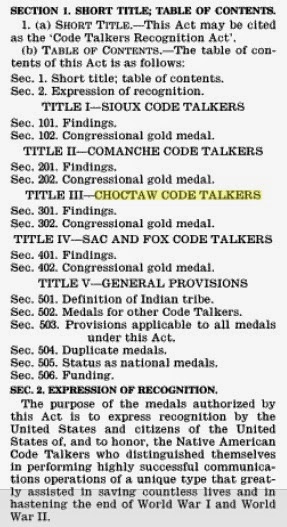If you follow national news about American Indians, you're probably familiar with the Code Talkers. Yesterday's New York Times ran a story about Chester Nez, a Navajo code talker who served in WWII. Mr. Nez passed away on June 4, 2014. Because of the sensitivity of the work they did, code talkers could not tell their families what they did. In recent years, those restrictions have been lifted.
Starr's comic reaches back to World War I. In Annumpa Luma, she deftly provides readers with a solid chunk of history. The comic opens with Choctaw soldiers in the trenches. They're talking Choctaw to each other... and the idea of their language as a code begins to take shape. They wonder if anyone will be open to their idea, because in government boarding schools, they were punished for speaking their language. Meetings take place, a test is devised, and the code is implemented. This is all conveyed through the perspective of Corporal Solomon Louis. His reunion with his wife, when he returns home, is heartwarming.
Using a popular format--comics--Starr and INC Comics shine a bright light on a little known piece of history. I look forward to seeing what else they give us. Order your copy of Annumpa Luma for $5.00 from INC.
~~~~~
Here is part of the U.S. Senate's Congressional Record for June 7, 2004. CHOCTAW CODE TALKERS is highlighted in the image to the right because it is what I was searching for in the record. Sioux, Comanche, and Sax and Fox code talkers in the Act were recognized for service in WWII. If you click on the link above for the congressional record, you can read the entire act. Because I'm writing about Starr's comic, I'm providing the entirety of what TITLE III says.
SEC. 301. FINDINGS
Congress finds that--
(1) on April 6, 1917, the United States, after extraordinary provocations, declared war on Germany and entered World War I, the War to End All Wars;
(2) at the time of that declaration of war, Indian people in the United States, including members of the Choctaw Nation, were not accorded the status of citizens of the United States;
(3) without regard to this lack of citizenship, many members of the Choctaw Nation joined many members of other Indian tribes and nations in enlisting in the Armed Forces to fight on behalf of the United States;
(4) members of the Choctaw Nation were--
(A) enlisted in the force known as the American Expeditionary Force, which began hostile actions in France in the fall of 1917; and
(B) incorporated in a company of Indian enlistees serving in the 142d Infantry Company of the 36th Division;
(5) a major impediment to Allied operations in general, and operations of the United States in particular, was that the fact that the German forces had deciphered all codes used for transmitting information between Allied commands, leading to substantial loss of men and material during the first years in which the military of the United States engaged in combat in World War I;
(6) because of the proximity and static nature of the battle lines, a method to communicate without the knowledge of the enemy was needed;
(7) a commander of the United States realized the fact that he had under his command a number of men who spoke a native language;
(8) while the use of such native languages was discouraged by the Federal Government, the commander sought out and recruited 18 Choctaw Indians to assist in transmitting field telephone communications during an upcoming campaign;
(9) because the language used by the Choctaw soldiers in the transmission of information was not a European language or on a mathematical progressions, the Germans were unable to understand any of the transmissions;
(10) the Choctaw soldiers were placed in different command positions to achieve the widest practicable area for communications;
(11) the use of the Choctaw Code Talkers was particularly important in--
(A) the movement of American soldiers in October of 1918 (including securing forward and exposed positions;(12) in the opinion of the officers involved, the use of Choctaw Indians to transmit information in their native language saved men and munitions, and was highly successful;
(B) the protection of supplies during American action (including protecting gun emplacements from enemy shelling); and
(C) in the preparation for the assault on German positions in the final stages of combat operation sin the fall of 1918;
(13) based on that successful experience, Choctaw Indians were withdrawn from front line units for training in transmission of codes so as to be more widely used when the war came to an end;
(14) the Germans never succeeded in breaking the Choctaw code;
(15) that was the first time in modern warfare that the transmission of messages in a Native American language was used for the purpose of confusing the enemy;
(16) this action by members of the Choctaw Nation--
(A) is another example of the commitment of Native Americans to the defense of the United States; and(17) the Choctaw Nation has honored the actions of those 18 Choctaw Code Talkers through a memorial bearing their names located at the entrance of the tribal complex in Durant, Oklahoma.
(B) adds to the proud legacy of such service; and
SEC. 302. CONGRESSIONAL GOLD MEDAL.
The Speaker of the House of Representatives and the President Pro Tempore of the Senate shall make appropriate arrangements for the presentation, on behalf of Congress of a gold medal of appropriate design honoring the Choctaw Code Talkers.




1 comment:
Teaching irony is a component of the Common Core. Well, here you go!
Post a Comment